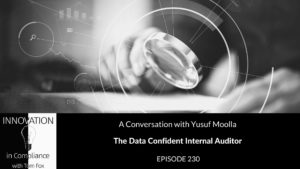
Tom Fox welcomes Yusuf Moolla on this episode of the Innovation in Compliance Podcast. Yusuf is a Director at Risk Insights, co-cost of The Assurance Show Podcast, and co-author of The Data Confident Internal Auditor. He joins Tom to talk about how compliance professionals can utilize data analytics, data governance, and internal auditing.
Best Approaches To Data
The easiest way to approach data, Yusuf suggests, is to think about it as another form of evidence. “Over the years we’ve collected lots of manual documents as evidence…Data is just another piece of evidence,” he tells Tom. Data can be used by anybody, and it is very simple to do so. Currently, there has been an emergence of open-source tools to process data which has made it easier and cheaper for individuals. These open source tools have made it safer as well, as there are options to look into the source code for digital traps. Visualization is another approach to data that individuals can utilize. While relatively new, being able to visualize techniques both in terms of exploring and explaining data is becoming something that is gaining traction in the data analytics world.
Internal Auditing Approaches
Yusuf explains to Tom that there are four main data approaches to consider when doing internal audits:
- Data being used purely for reporting
- The data-driven approach where the data does the talking
- The process-focused approach
- The hypothesis-focused approach
There are similarities between the process and hypothesis approaches. The process-focused approach has been the traditional way of doing audits. Over the years, however, it’s become less about how the process is done to achieve the intended result; it’s now about what the auditing result is. “So it’s not about looking at whether a process actually works the way that it’s been designed, it’s about looking at whether the process is working in the way in which it’s intended to be able to achieve its outcome,” Yusuf adds.
Data Governance in Auditing
Making sure that data doesn’t fall into the wrong hands as an auditor is one of the main facets of data governance. It is a very basic and traditional approach, but over the years professionals have been implementing it in an overzealous way. This can hinder the ability to create value through data. Yusuf suggests a slight reverse approach where everyone has access to data unless there is a specific reason for them not to. “We want to keep a range of data elements secure, but others we want to open up,” Yusuf tells Tom.
A Look Ahead
Tom asks Yusuf what the future of data analytics, data governance, and internal auditing will look like in the coming years. Yusuf explains that there will be a greater use of data science, and a greater use of data within internal audit without the need for data scientists and specialists. More practitioners will be getting into, and understanding IT, and more people will be using data for themselves. This will free the data scientists from the more mundane tasks, so they will have time to dedicate to the more advanced techniques. The same would apply for compliance as well.
Resources
Yusuf Moolla | LinkedIn
Risk Insights
The Assurance Show
The Data Confident Internal Auditor






